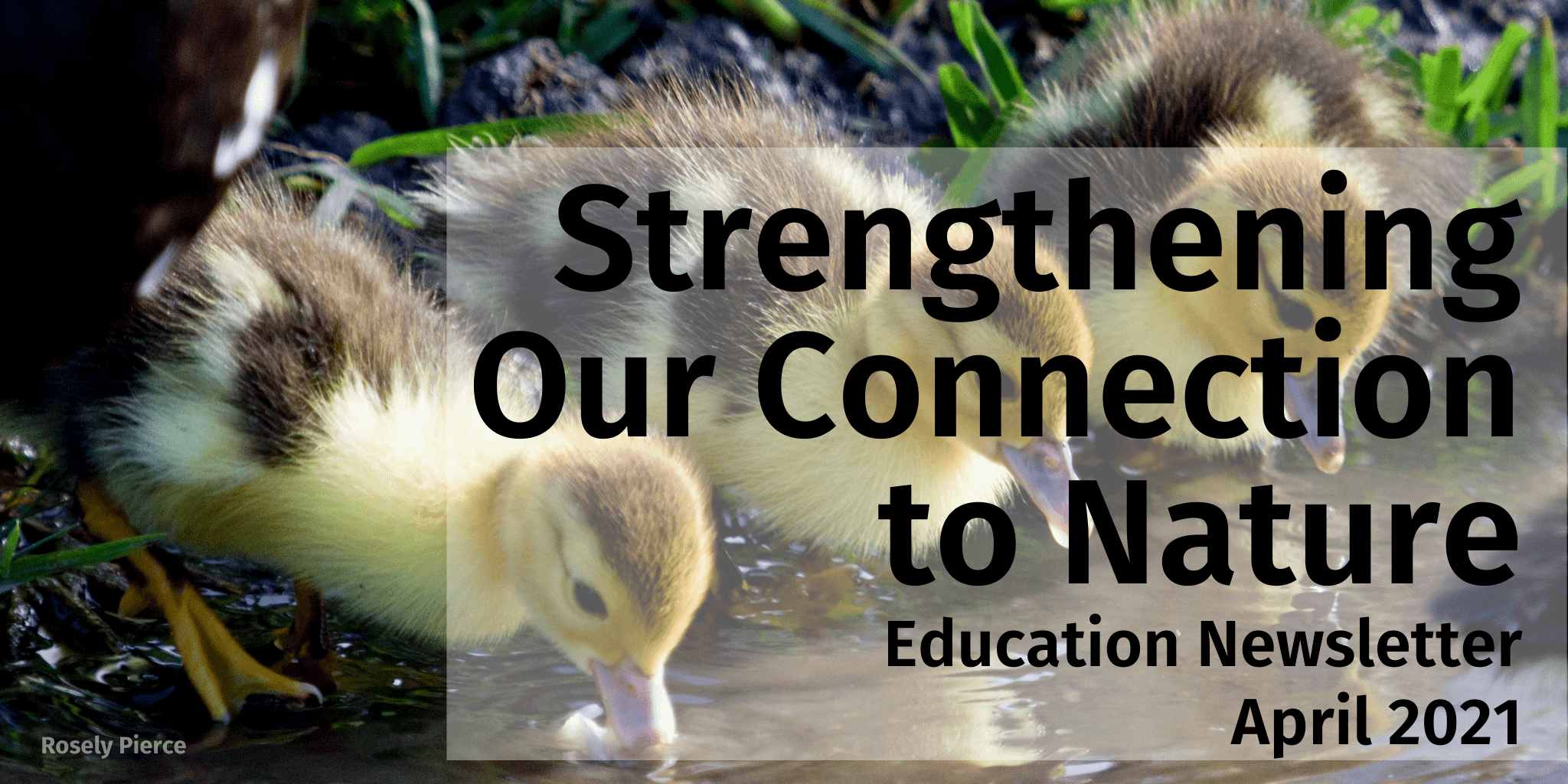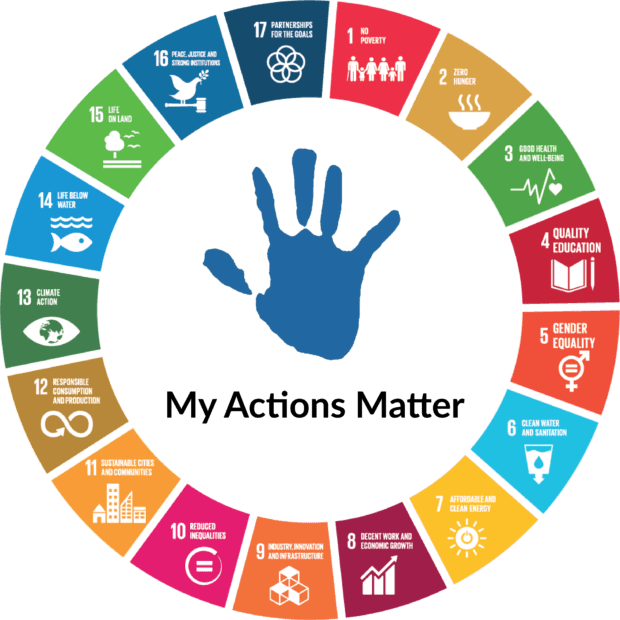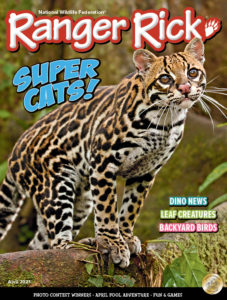We have much more to do and your continued support is needed now more than ever.
Education Newsletter April 2021

What does spring signify for you?
For many, it is the dawn of summer, a season filled with outdoor adventure and the chance to reconnect with nature. For others, it’s a season of renewal and hope, a brief yet necessary few months that tell us with every birdcall and budding flower that we’ve made it through winter. As we enter April, it’s a perfect time to create some space and reflect on what this season in your life signifies to you.
As difficult as this past year has been, it has shown us our resilience and strength and forced us to reevaluate our priorities and values. How many of us have realized the importance of friendship, community, and our connection to nature? Now that spring is here and the long summer days are just around the corner, we can create a new life full of possibility, hope, and the promise of better things ahead.
Biodiversity Pathway
With the arrival of spring comes a variety of hands-on and virtual learning opportunities related to biodiversity and interconnected with the UN Sustainable Development Goals.
- National Wildlife Week [SDG15] Join the National Wildlife Federation April 5-9 as we celebrate National Wildlife Week. Find ways to use your voice and your time to make a difference for wildlife. Be sure to follow along on social media the week of April 5th!
- Global Action Days – My Actions Matter [SDGs 13, 14, 15] Schools are invited to participate in the Global Action Days 2021 campaign #MyActionsMatter. Using the TreasureEarth mobile app, take small positive actions over 21 days, starting on Earth Day. Join the Foundation for Environmental Education for an informational webinar on April 7th (which will be recorded for later viewing). Teachers can register for the campaign by emailing eco-schoolsusa@nwf.org. Be on the lookout for more information on Eco-Schools USA social media during the month.

- Earth Day [SDG13] Follow @EcoSchoolsUSA on Instagram as we share simple actions to take during Earth Month. Starting April 20th, EARTHDAY.org provides several opportunities for both students and educators to participate in 3 days of climate-focused activities.
Take Learning Outside
Whether you live in an urban, suburban, or rural area, biodiversity is all around! Engage students where they are with lessons that use the SEEK app from iNaturalist. Download a lesson for grades 3-5 and 6-12 from our Virtual Resources page.
The City Nature Challenge offers residents a chance to discover the breadth of biodiversity in their neighborhood while utilizing iNaturalist. Last year, participants made over 815,000 observations from 244 cities around the world. For 2021, nature observations will be collected between April 30th and May 3rd. Discover how to participate and find related lessons and activities.
Discover New Resources
In today’s digital world, engaging storytelling happens through many different formats. One way the National Wildlife Federation (NWF) brings important conservation and climate issues to life is by using an ArcGIS Story Map. Most recently, NWF and affiliate, Association of Northwest Steelheaders, worked together to create Salmon Migration. The story map weaves together several essential aspects of the salmon story, including their epic journey, threats faced as a species along the way, and the community stories that demonstrate the cultural importance of salmon for Indigenous peoples, anglers, and riverside communities in the region. Take a look!
Another story map, Unnatural Disasters, was created to illustrate the impact of natural disaster trends that have been exacerbated by climate change, such as hurricanes, wildfires, and droughts. Last updated to include natural disasters from 2019, this story map also details the impact on local economies and wildlife for each event. Both of these story maps can be used as engaging learning resources with older students. Connect the salmon story with the Eco-Schools USA Watersheds Pathway or the Unnatural Disasters with the Climate Change Pathway.
Learn About Wildlife

The Super Cats! story in the April issue of Ranger Rick® magazine highlights a few of the amazing abilities of wild cats. Learn about the powerful jaws of the jaguar or the caracal’s ability to leap off the ground to catch birds in this colorful story of wild cats in action. Continue the lesson with the Super Cats Having Super Adventures! extension activity found in the April Ranger Rick Educator’s Guide. Use the creative writing prompts as a starting point for students to create their own cat adventures. Dig further into learning facts about other wild cats like the mountain lion with the National Wildlife Federation’s Wildlife Guide.
Virtual Green Opportunities & Resources
National Wildlife Federation
- High School groups and classes can learn about and prepare for tomorrow’s green workforce at the virtual NWF EcoCareers Conference on 4/7 and 4/8.
- Registered Eco-Schools – don’t forget to apply for a recognition badge for your school dashboard upon meeting the criteria upon completion of any Eco-Schools USA at Home modules.
- Virtual course: Climate Change: Building climate science knowledge to enact local change (grades 9-12)
- Career Services Toolkit. Designed for career services professionals, guidance counselors, teachers, and other educational professionals to provide a framework and process for utilizing the National Wildlife Federation’s (NWF) EcoCareers resources in their classes, on their campuses, and in coordination with other academic and career development programming.
Other Resources & Opportunities
- Registration is now open for the virtual Green Schools Conference on June 28-29th.
- Explore these creative ideas for participating in Bike to School Day on 5/5/21 with your family, in your neighborhood, or at school.
- Find garden activities and lesson plans from KidsGardening.org.
- See what’s happening for Endangered Species Day in May!
- Explore social justice teaching resources from NSTA.
- Youth 11-18 can enter the 10th Annual Bow Seat Ocean Awareness Contest “Water Rising.” Submissions can be made in a variety of forms, including poetry and spoken word, creative writing and music.
- Participate in GLOBE Measurement Campaigns. These campaigns are great for virtual and in-person learning experiences.
- The World’s Largest Lesson – Introducing the Sustainable Development Goals to young people





















